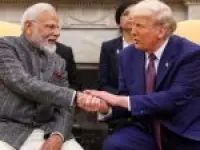
‘One Nation, One Election’ To Be Implemented In Current Tenure Of Modi Govt: Report
The Bharatiya Janata Party-led NDA government will implement the long discussed ‘one nation, one election’ within its current tenure, according to media reports. The Modi government has reportedly formed a high-level committee headed by former President Ramnath Kovind.
The Kovind panel submitted its report on the same to President Droupadi Murmu in March, backing the idea of simultaneous elections for the Lok Sabha and the state assemblies in the first phase. This is expected to be followed by synchronised local body elections (municipalities and panchayats) within the span of 100 days, as prescribed by the recommendations of the panel, reported NDTV.
Read Also | ‘One Nation One Election’: All You Need To Know
The Law Commission is also expected to recommend it soon. The commission is likely to propose Lok Sabha, state assemblies, and local bodies hold simultaneous elections starting with 2029 along with a provision in cases including hung house or no-confidence motion.
The Kovind panel has not specified any period for rolling out simultaneous polls.
“Definitely, it (simultaneous polls) will be implemented in this tenure itself. The government is confident that the reform measure would receive support across party lines and that the cohesion within the ruling alliance would continue throughout the term,” quoted
Read Also | Kolhapur Panchayat Passes Resolution Barring Registration Of New Muslim Voters
The panel proposed establishing the ‘Implementation Group’ to look into the execution of the recommendations by the panel. Nearly 18 constitutional amendments have been recommended. Most of these will not need ratification by the state assemblies, but they will require certain constitutional amendment bills, which will be passed by the Parliament.
Earlier this August, Prime Minister Narendra Modi had mentioned the same during his Independence Day speech, arguing that frequent elections hampered the ‘country’s progress.’
Meanwhile, the opposition has consistently flagged ‘One Nation, One Election’ as unconstitutional, citing it will arbitrarily curtail or extend the terms of existing legislatures to bring their election dates in line with the due date of the rest of the country. Thus, it will undermine democracy and federalism.
Read Also| Almost 6 Crore Spent On Print Ads For PM’s “Mann Ki Baat” In Ten Years: RTI
The opposition also argued that the scheme may influence voter behaviour, with voters ending up voting for national issues even for state elections; it may also marginalise regional parties, who perform better in state assemblies, and lead to larger national parties winning both state and Lok Sabha elections.













